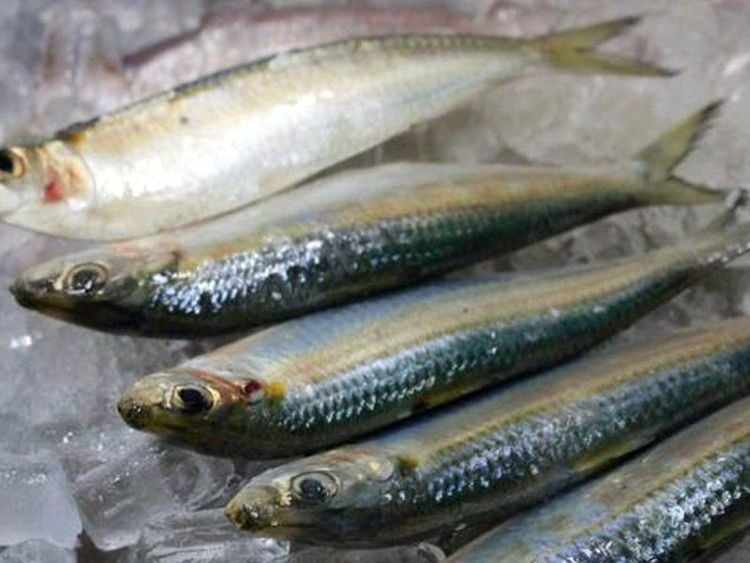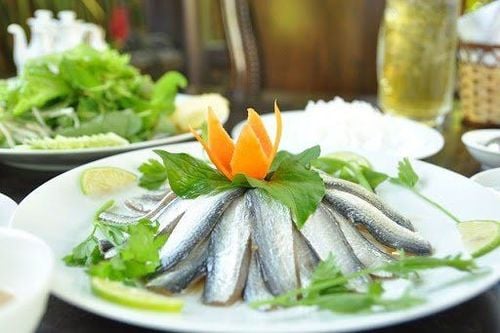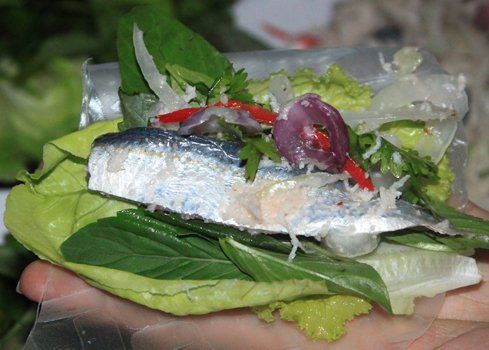Raw herring is a delicacy due to its high nutritional content, and dishes featuring raw herring have become increasingly common in the diets of some Vietnamese households. However, there are several reasons why people prefer cooking herring instead of consuming it raw. So, is it advisable to eat raw herring?
1. Is Eating Raw Herring Advisable?
Herring can be consumed raw if properly prepared and processed, such as through pickling. Pickled herring is enjoyed worldwide but is particularly popular in Scandinavia and Northern Europe. Herring is found throughout the North Atlantic, from the Gulf of Maine to the Gulf of St. Lawrence, around Iceland, and in the Northeast Atlantic, from the Barents Sea to the English Channel and the Celtic Sea.
Most of the pickled herring consumed in the United States is harvested from the Atlantic off the east coast, from Maine to North Carolina. Salting herring is a traditional preservation method. The process typically involves two steps:
- First, the fish is brined in salt to remove moisture. Afterward, the salt is washed off, and the herring is soaked in a brine mixture of vinegar, salt, and sugar.
- The second step involves adding flavorings to suit personal tastes or preferences. Common flavoring choices include peppercorns, onions, mustard, dill, and wine.
In industrial production, herring is typically salted and packaged into small containers for easier transportation and storage. Pickled herring is highly nutritious, particularly rich in heart-healthy omega-3 fatty acids.
Nutritional Information for ¼ cup of pickled herring includes:
- Calories: 92
- Protein: 5 grams
- Fat: 6 grams
- Carbohydrates: 3 grams
- Fiber: 0 grams
- Sugar: 3 grams
Pickled herring is an excellent source of vitamin B12 and iron. Additionally, it provides a wealth of omega-3 fatty acids, offering significant health benefits.

2. Health Benefits of Raw Herring
Consuming foods rich in omega-3 fatty acids, such as pickled raw herring, can lower the risk of chronic conditions like cardiovascular disease, diabetes, and hypertension. Other potential health benefits include:
- Reduced Risk of Cardiometabolic Disease: Recent studies on the relationship between omega-3 fatty acids and heart health are promising. Researchers have found that omega-3s can lower the risk of cardiovascular diseases, particularly coronary artery disease, by reducing abnormal heart rhythms that could lead to sudden cardiac arrest. Decreasing blood triglyceride levels. Slowing the progression of arterial plaque, which can cause blockages. Preventing inflammation and blood clots. These factors collectively reduce the likelihood of developing heart-related conditions.
- Supporting Essential Bodily Functions: The vitamin B12 found in pickled herring aids various bodily functions, including brain function and maintaining a healthy nervous system. Alongside folate (vitamin B9), it helps the body produce red blood cells.
- Preventing Anemia: The iron content in pickled herring enables the body to produce hemoglobin, a protein in red blood cells that carries oxygen throughout the body. Insufficient iron intake can impair this function, leading to anemia. Symptoms of anemia include fatigue, dizziness, shortness of breath, and headaches.
Like fresh herring, pickled herring is a natural source of vitamin D3, omega-3 fatty acids, selenium, and vitamin B12. A 100-gram serving of pickled herring provides: 680 IU of vitamin D (170% of daily recommended intake), 84% of daily selenium requirements, 71% of daily vitamin B12 needs.
3. Potential Risks of Pickled Herring
Pickled herring has a high sodium content, which can contribute to increased blood pressure and raise the risk of heart attack.
Pickled herring is also rich in tyramine, so it should be avoided in the diet of individuals undergoing treatment with monoamine oxidase inhibitors for depression. This organic compound has also been linked to headaches, so individuals with migraines should be cautious when consuming pickled herring.
Today, there is growing concern about overfishing herring and the excessive mercury content, which can negatively impact health. However, consumers can be reassured about the mercury levels in certain fish, including herring and sardines. Herring has a low mercury content compared to most fish, with only 0.04 milligrams of mercury per kilogram of fish. The U.S. Centers for Disease Control and Prevention allows a maximum mercury content of 0.3 milligrams, which is a much more cautious level than the standard set by the World Health Organization.

The sustainability of herring is also closely monitored. This species is not farmed, and most of it is caught in the wild, so consumers need not worry about the loss of high omega-3 fatty acids, a common issue with farmed fish. Herring is not considered a high-allergy food, but there have been cases of histamine toxicity from poorly stored and refrigerated herring. This "fish poisoning" can cause redness, swelling, and rash on the skin, headaches, and digestive symptoms.
If you're concerned about the high sodium content in pickled herring, you might consider trying smoked herring, which contains significantly less sodium, or fresh, unprocessed herring.
4. Fascinating Facts About Raw Herring
The tradition of pickling raw herring dates back centuries and is even depicted in various works of art, including paintings from the 1890s.
The practice of catching and pickling herring began in the Middle Ages and continues across Europe today. While pickled herring is available in the U.S., it is less popular and not a dietary staple for most Americans. Regional consumption methods vary significantly across states.
In the Netherlands, people often eat large pieces of herring whole. Meanwhile, in Russia, Poland, or Ukraine, herring is diced and paired with beets and mayonnaise. Scandinavians commonly enjoy pickled herring on rye bread, while many Jewish communities in New York favor the rich, fatty fish.
Owing to its popularity within Jewish communities, pickled herring often appears at social gatherings and religious events, as well as on menus at kosher delis. Polish, Lithuanian, and Ukrainian families serve pickled herring as a Christmas Eve delicacy, while Scandinavians favor it on New Year’s Eve.

Herring, a small wild-caught fish, is a staple in European cuisine and a close relative of sardines. It is a robust species with low toxicity levels. Herring is a significant source of essential nutrients, including omega-3 fatty acids, vitamin D, and selenium, which combat heart disease, certain cancers, mood disorders, and age-related ailments. Fish with omega-3s can also help prevent age-related problems, inflammation, and chronic pain. Pickled herring is often served in Europe, where it is considered a staple, as well as a dish served during certain holidays. You can buy cans of pre-packaged pickled herring to eat, or pickle it yourself.
Due to its rich nutritional profile and versatility, herring is an excellent addition to meals, suitable for all ages. Whether pickled, smoked, or fresh, it can elevate family meals with its unique flavor and health benefits.
To arrange an appointment, please call HOTLINE or make your reservation directly HERE. You may also download the MyVinmec app to schedule appointments faster and manage your reservations more conveniently.













